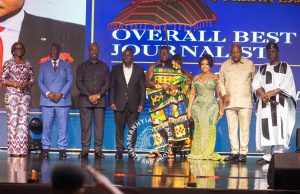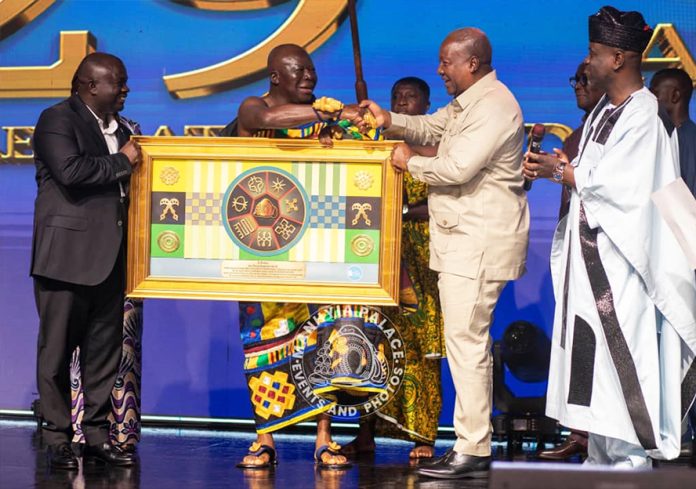The Asantehene, Otumfuo Osei Tutu II, has expressed grave concern over the growing threat that unregulated new media poses to the future of journalism in Ghana, urging practitioners, policymakers and the general public to act decisively to safeguard the integrity and credibility of the profession.

Speaking at a dinner ceremony during the 29th Ghana Journalists Association (GJA) Awards held at the Manhyia Palace on Saturday, November 8, 2025 the Asantehene lamented the negative influence of unmonitored digital platforms and the increasing disregard for journalistic ethics in the country’s fast-changing media landscape.
According to him, the rapid expansion of digital media, while a tool for democratising information, has also created avenues for abuse, misinformation and the erosion of professional standards.
These trends, he cautioned, not only endanger journalism as a noble profession but also have far-reaching consequences for democracy, national stability and societal values.
“There are wider issues, more profound in their implications for policymakers and consumers alike.
“We must ask ourselves two fundamental questions: How worried should we be about the potential hijacking of journalism by professional hustlers, and can our nation afford a media that operates with no regard for the rule of law?”
He emphasised that while the right to free expression remains central to democratic governance, it does not grant the media absolute freedom to act without accountability.
“Any form of media, new or old, operating without legal restraint is a direct threat to democracy,” he warned, stressing that the rule of law must guide every sphere of society, including journalism.
The Asantehene also voiced concern over the deteriorating moral and linguistic standards in Ghana’s media space, especially online, where vulgarity, sensationalism, and unverified claims often dominate public discourse.
He warned that such trends could distort national values and diminish the intellectual capacity of future generations.
“Our cherished traditional values have been swept away in a slurry of language unfit for humankind,” he observed, adding “When you fill the mind with garbage and filth, the brain becomes shaped by garbage and the output we can expect is nothing but garbage.”
Otumfuo Osei Tutu II called for renewed commitment among media stakeholders to restore honour and discipline within the profession.
He urged journalists, regulators, and academic institutions to engage in open and constructive dialogue on how to preserve the dignity and credibility of journalism in the digital age.
Invoking the memory of legendary media figures such as P.A.V. Ansah, the Asantehene reminded practitioners of the profession’s rich legacy of integrity and excellence.
He challenged the Ghana Journalists Association and media training institutions to rekindle the spirit of professionalism and responsibility that once defined Ghanaian journalism.
“The media is a mirror of society. If the reflection becomes distorted, the nation itself begins to lose its sense of direction.
“Let us, therefore, defend the principles that uphold truth, decency, and accountability in our media space,” he said.
In recent years, Ghana’s media environment has undergone dramatic transformation with the proliferation of online news portals, blogs, and social media platforms.
While these digital tools have democratized access to information and expanded the public’s voice, they have also fuelled the spread of misinformation and blurred the line between professional journalism and citizen commentary.
Regulating this expanding media ecosystem has proven difficult, as traditional legal frameworks struggle to keep pace with technological change.
The result, analysts say, is an uneven playing field where credible journalists compete with unverified sources, and truth often battles for survival against sensationalism and propaganda.
The Asantehene’s remarks come at a critical moment when the Ghana Journalists Association continues to champion ethical reporting, press freedom and the strengthening of professional standards in an increasingly digital and competitive media landscape.









